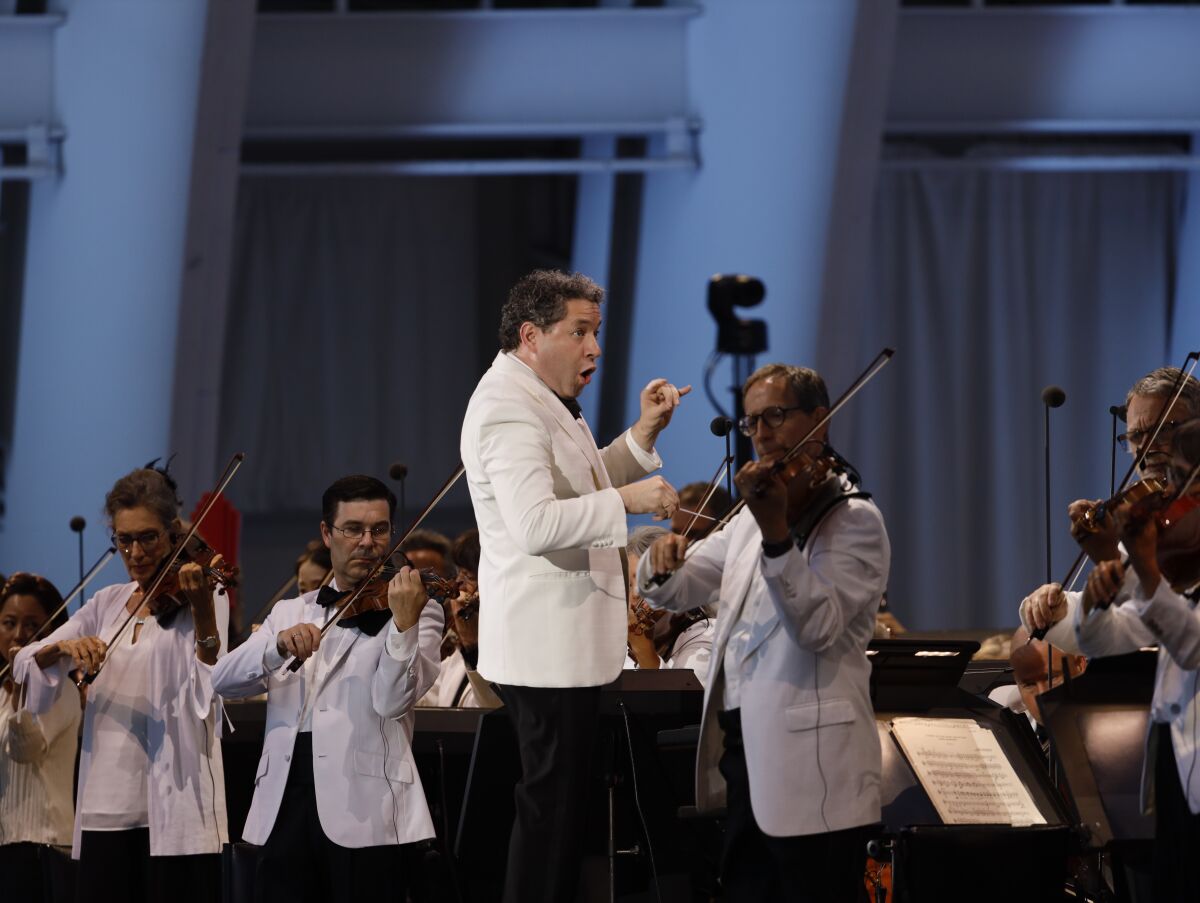Thursday night, at what has long been his summer home away from home, Gustavo Dudamel opened this summer's Los Angeles Philharmonic Hollywood Bowl season. The video cameras caught a contented smile on his face and a cheerful gait to his walk as he came on stage to lead the national anthem. Someone from the bleacher seats shouted, "Don't go!"
Dudamel's not, presumably, going anywhere just yet. He still has three full L.A. Phil seasons on his contract as music and artistic director before he moves on to the New York Philharmonic beginning in 2026. But that can seem like tomorrow, given the latest Dudamel hysteria in New York. Between May 13 and the end of the month, nine New York Times writers wrote or contributed to some 10 articles of various kinds — review, feature, commentary, news story, photo essay, opinion piece — abou t the Los Angeles Philharmonic and/or its music director.
The L.A. Phil is so hot that even the political columnist Maureen Dowd found herself intrigued by our orchestra supposedly having induced, with a little help from Tchaikovsky, an orgasm in an audience member.
But Thursday at the Bowl turned out to be down-jacket chilly. And although Dudamel's winning program did not disappoint, it wasn't the special one originally advertised.
Originally the concert was to include a staged performance by director Alberto Arvelo of Mendelssohn's incidental music to "Midsummer's Night Dream" with vocal soloists and the Los Angeles Master Chorale. In a year with international celebrations of the 150th anniversary of the legendary stage and film director, Max Reinhard, the production would have allowed Dudamel to rejuvenate one of the most celebrated nights in Bowl history: Reinhard's 1934 staging of Shakespeare's play with Mendelssohn's incidental music that was later turned into a classic Hollywood movie.
The Mendelssohn was recently dropped for the unsatisfying excuse of scheduling conflicts. Instead, Dudamel — who is just back from Venezuela, where he and Arvelo filmed Beethoven's "Fidelio" based on their illuminatingly rejuvenated L.A. Phil production in collaboration with Deaf West Theatre — replaced it in part with Mussorgsky's "Night on Bald Mountain" and Dukas' "The Sorcerer's Apprentice," two exceedingly familiar works that have found their way to generations of kids thanks to another Hollywood classic, Walt Disney's 1940 animated "Fantasia." Ravel's "Mother Goose" Suite was also added, while r etained from the original Bowl program was Manuel de Falla's "Nights in the Gardens of Spain," a piano concerto of sorts with Javier Perianes as soloist.
All four works are musical representations of fanciful magic, midsummer dreams of quite different sorts. One of our most effective conductor storytellers, Dudamel began by launching with startling urgency into "Night on Bald Mountain" directly on the heels of a fervent "Star-Spangled Banner." What that meant was left to ponder.

Dudamel still has three full L.A. Phil seasons on his contract as music and artistic director before he moves on to the New York Philharmonic beginning in 2026.
(Allen J. Schaben / Los Angeles Times)
"Bald Mountain" happens to be a lovely nature reserve favored by picnickers and Satanic worshipers alike. It was once a Russian fortress. It lies just outside Kyiv, Ukraine. Mussorgsky evokes a midnight witches' sabbath. The standard Rimsky-Korsakov arrangement that Dudamel used is more flowered than the messy Mussorgsky original, but it is also more nuanced.
Dudamel may or may not have meant t his as a statement of world affairs, but it could be heard as an impressively nuanced expression of how beauty and beastliness coexist in nature and society. The performance, astutely played, pitted war against peace, fervid music and its luxuriating opposite at the center of so much Russian art.
Further pitting Mussorgsky against Ravel's ravishing "Mother Goose," which began the program's second half, was downright beast against beauty. In the suite's fourth movement, "Beauty and the Beast," sweet clarinet beauty meets bumbling bass bassoon beast. A harp glides. A solo violin nostalgically reflects. Dudamel smiled a lot throughout the evening and certainly here. In the final movement of the suite, "The Fairy Garden," that followed, Ravel sprinkles melodic magic dust over everything.
Dukas' source for "The Sorcerer's Apprentice" was a poem by Goethe that warns of what can happen when a magical device, in this case a broom bent upon destruction, gets into a young apprentice's incompetent hands. It's a relatively light-hearted score (again, fun with the bass bassoon), but that only helps make a point that couldn't resonate with more relevance in a world unmindfully assigned to technology.

Dudamel conducted more attuned to music than the fuzzy logic of magic Thursday night at the Hollywood Bowl.
(Allen J. Schaben / Los Angeles Times)
"Nights in the Gardens of Spain," the most recent work on the program, was the one written in wartime. It offers a respite from the battlefields of the First World War in three Andalusian gardens, where the perfumed night atmosphere is one of intoxication, be it mystery, love or the compulsion at all times to dance.
Falla's evocations are of his own time and place, not a trucking in allegories. The piano is a glitter machine, and Perianes, himself Spanish, plays with sparks and with fire, against Falla's more iridescent orchestra.
For no good reason, this is the evening's one score that is somewhat neglected, although it has had its fine champions, Arthur Rubinstein and Martha Argerich amon g them. Perianes turned up the flame for his encore, Falla's "Ritual Fire Dance."
Through it all, Dudamel conducted more attuned to music than the fuzzy logic of magic, the storyteller happily marshalling forces, marveling in details, painting pictures, suggesting sensations. The best magicians never reveal their hands.
No comments:
Post a Comment